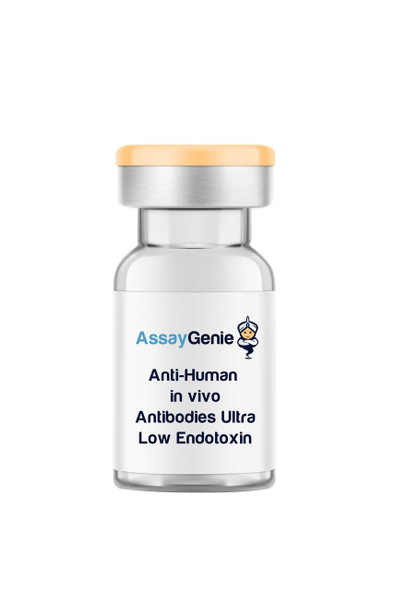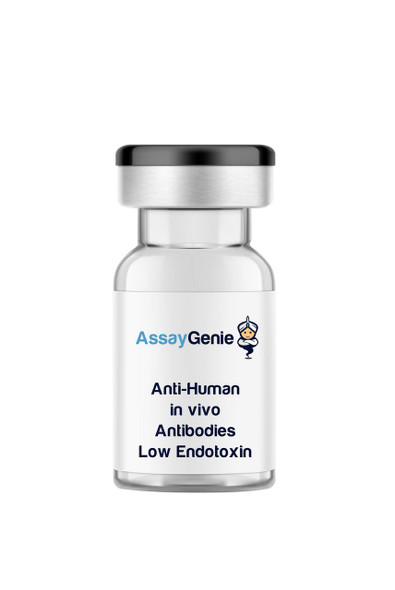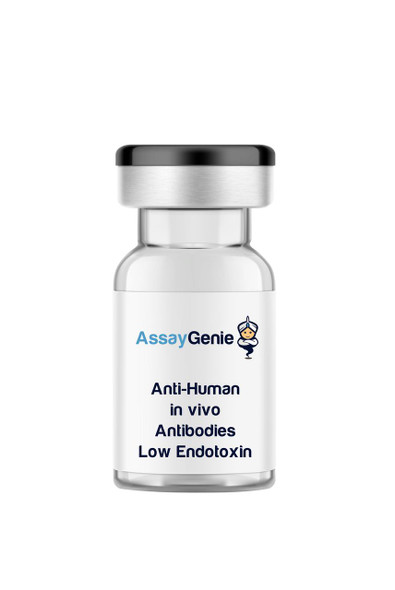Anti-Human EGFR In Vivo Antibody - Low Endotoxin (IVMB0126)
- SKU:
- IVMB0126
- Antibody Type:
- Functional-Grade In Vivo Antibody
- Applications:
- In Vivo
- Disease Area:
- Lung Cancer
- Disease Area:
- Colorectal Cancer
- Clone:
- EGFR.1
- Protein:
- EGFR
- Isotype:
- Mouse IgG2b kappa
- Reactivity:
- Human
- Synonyms:
- Epidermal Growth Factor Receptor
- ERBB
- ERBB1
- mENA
- Endotoxin Level:
- Low Endotoxin
- Host Species:
- Mouse
- IHC
- WB
Description
Anti-Human EGFR In Vivo Antibody - Low Endotoxin
Introducing the Anti-Human EGFR In Vivo Antibody - Low Endotoxin from Assay Genie, a highly specific monoclonal antibody designed for in vivo applications. This antibody targets the Epidermal Growth Factor Receptor (EGFR), an essential protein in cell growth and differentiation, making it ideal for research in oncology and related fields.
With its mouse IgG2a kappa isotype, it ensures high purity and low endotoxin levels (<1.0 EU/mg), perfect for ELISA, flow cytometry, immunohistochemistry, and other assays. Available in various sizes, it is formulated in phosphate-buffered saline for stability and efficacy. Enhance your research with this reliable and versatile antibody. EGFR, or Epidermal Growth Factor Receptor, is a transmembrane glycoprotein that is a member of the protein kinase superfamily. It is involved in the regulation of cell growth, survival, proliferation, and differentiation by binding to its specific ligands. Abnormal activation or overexpression of EGFR is associated with various types of cancers, making it a crucial target for cancer research and therapeutic interventions.
| Product Name: | Anti-Human EGFR In Vivo Antibody - Low Endotoxin |
| Product Code: | IVMB0126 |
| Size: | 1mg, 5mg, 25mg, 50mg, 100mg |
| Clone: | EGFR.1 |
| Protein: | EGFR |
| Product Type: | Monoclonal Antibody |
| Synonyms: | Epidermal Growth Factor Receptor, ERBB, ERBB1, mENA |
| Isotype: | Mouse IgG2b κ |
| Reactivity: | Human |
| Immunogen: | A431 cultured cells |
| Applications: | IHC, WB |
| Formulation: | This monoclonal antibody is aseptically packaged and formulated in 0.01 M phosphate buffered saline (150 mM NaCl) PBS pH 7.2 - 7.4 with no carrier protein, potassium, calcium or preservatives added. |
| Endotoxin Level: | < 1.0 EU/mg as determined by the LAL method |
| Purity: | ≥95% monomer by analytical SEC >95% by SDS Page |
| Preparation: | Functional grade preclinical antibodies are manufactured in an animal free facility using only In vitro protein free cell culture techniques and are purified by a multi-step process including the use of protein A or G to assure extremely low levels of endotoxins, leachable protein A or aggregates. |
| Storage and Handling: | Functional grade preclinical antibodies may be stored sterile as received at 2-8°C for up to one month. For longer term storage, aseptically aliquot in working volumes without diluting and store at -80°C. Avoid Repeated Freeze Thaw Cycles. |
| Applications: | IHC, WB |
| Reactivity: | Human |
| Host Species: | Mouse |
| Specificity: | Clone EGFR.1 recognizes the human EGFR. |
| Immunogen: | A431 cultured cells |
| Concentration: | ≥ 5.0 mg/ml |
| Endotoxin Level: | < 1.0 EU/mg as determined by the LAL method |
| Purity: | ≥95% monomer by analytical SEC >95% by SDS Page |
| Formulation: | This monoclonal antibody is aseptically packaged and formulated in 0.01 M phosphate buffered saline (150 mM NaCl) PBS pH 7.2 - 7.4 with no carrier protein, potassium, calcium or preservatives added. |
| Preparation: | Functional grade preclinical antibodies are manufactured in an animal free facility using only In vitro protein free cell culture techniques and are purified by a multi-step process including the use of protein A or G to assure extremely low levels of endotoxins, leachable protein A or aggregates. |
| Storage and Handling: | Functional grade preclinical antibodies may be stored sterile as received at 2-8°C for up to one month. For longer term storage, aseptically aliquot in working volumes without diluting and store at -80°C. Avoid Repeated Freeze Thaw Cycles. |
EGFR is a 170 kD transmembrane glycoprotein that is part of the ErbB family of receptors within the protein kinase superfamily. EGFR is one of four closely related receptor tyrosine kinases: EGFR (ErbB-1), HER2/c-neu (ErbB-2), Her 3 (ErbB-3) and Her 4 (ErbB-4). EGFR is essential for various processes including controlling cell growth and differentiation and ductal development of the mammary glands. Ligand binding induces dimerization and autophosphorylation. It consists of a glycosylated extracellular domain which binds to EGF and an intracellular domain with tyrosine-kinase activity necessary for signal transduction. TGFα, vaccinia virus growth factor, and related growth factors can also bind to and signal through EGFR. Abnormal EGFR signaling has been implicated in inflammatory diseases such as psoriasis, eczema and atherosclerosis. Alzheimer's disease is linked with poor signaling of the EGFR and other receptor tyrosine kinases. Furthermore, over-expression of the EGFR is linked with the growth of various tumors. EGFR has been identified as an oncogene, a gene which in certain circumstances can transform a cell into a tumor cell, which has led to the therapeutic development of anticancer EGFR inhibitors. EGFR is a well-established target for both mAbs and specific tyrosine kinase inhibitors.
| Technical Datasheet: | View |
| Protein: | EGFR |
| Ligand/Receptor: | Members of the epidermal growth factor (EGF) family such as EGF, TGF-α, amphiregulin, betacellulin, heparin-binding EGF-like growth factor, GP30 and vaccinia virus growth factor |
| Research Area: | Cell Biology, Signal Transduction |

| Mouse IgG2b Isotype Control | |
|---|---|
| Clone | MPC-11 |
| Isotype | Mouse IgG2b kappa |
| Endotoxin Level | Low Endotoxin |
Meet the team!
Shane Costigan
Territory Manager & Team Lead
Abdul Khadim
Sales Executive






